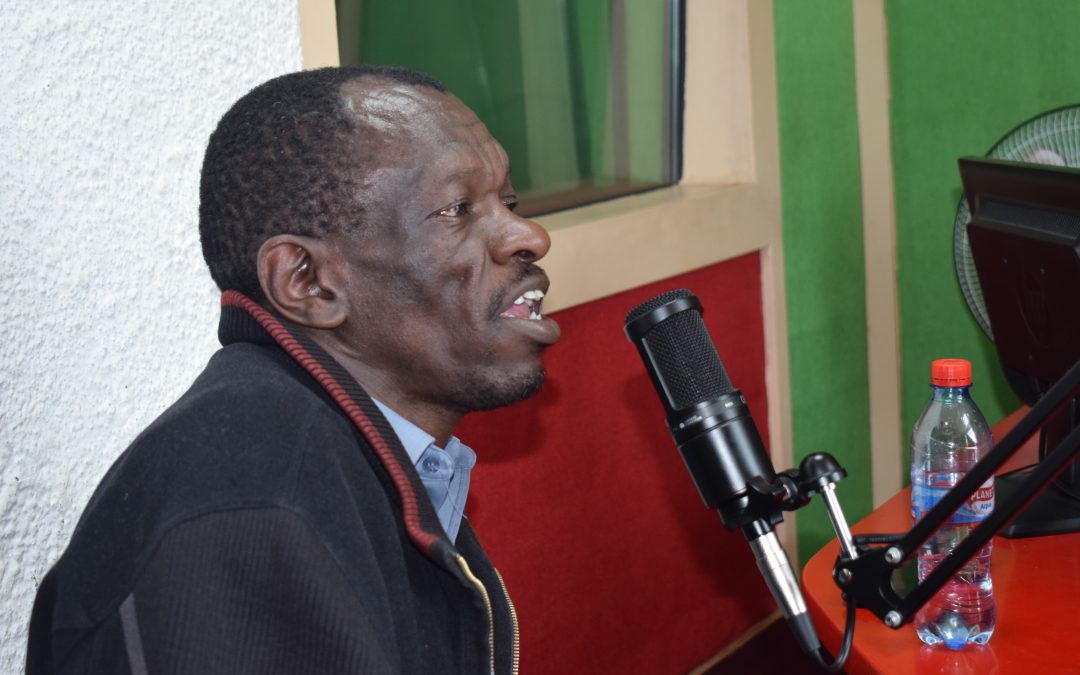Caption: Nyatigi Fredrick, the Children Officer Kapenguria, West Pokot county speaks about the role of men in ending Female Genital Mutilation at Kalya FM during the International Day of Zero Tolerance for Female Genital Mutilation.
On February 6, the world commemorates the International Day of Zero Tolerance for Female Genital Mutilation (FGM). The day comes hot on the heels of the recent viral video of a group of men beating up a young girl in Kuria for refusing to undergo the cut.
Reports indicate that the young girl fled her home to avoid the cut, but had returned to pick up her belongings ahead of the reopening of schools. She was staying in a rescue centre. However, her brother got hold of her, and together with his friends started beating her in broad daylight. They also, days later, took her to the forest and forcibly circumcised her.
This action, and many others, is a pointer to how men are still enablers of the vice that puts many girls’ lives in danger, and what is classified as violence against women and girls by the United Nations. The impact of FGM includes physical, emotional, and mental health problems, which affect the general well-being of women and girls both in the short- and long-term.
Additionally, since FGM is connected to marriageability, girls may be forced to drop out of school to get married, thus, affecting their ability to achieve their full potential and contribute fully to society. It also violates the right of girls and women to be free from torture and inhumane treatment. FGM also violates their right to life when the procedure results in death.
With the theme of the day as ‘Partnering with Men and Boys to transform Social and Gender Norms to End FGM’, we, as a society, are called upon to engage men and boys to eliminate the harmful practice.
Kenya is still a patriarchal society, where men are holders of power and where systems work to enhance this status quo. It is with this power that they can decide whether FGM can be eliminated. Men in their different positions, as fathers, husbands, community and religious leaders, can decide to take a stand on whether the practice continues or stop.
For example, as a father, a man can decide whether or not his daughter undergoes FGM and would garner support from his household or society for whatever decision made. A man can decide to marry a woman that has undergone the cut or can decide to do away with this prerequisite and advocate for the elimination of FGM.
This makes FGM, a men’s issue.
It is, therefore, important that we incorporate men in the activities that seek to eliminate FGM. We must also acknowledge and address the framing of societal narratives around men and patriarchy as an obstacle to male involvement. For starters, that fighting against FGM is a challenge to the status quo, and this would create an upset in power dynamics that may not augur well with the society and culture holders.
Already there have been efforts to eliminate FGM in the country. According to the recently released Kenya Demographic and Health Survey (KDHS) 2022, the prevalence of female genital mutilation in the country is at 15 per cent, a drop from 21 per cent in 2014.
This proves that with the effort and involvement of all stakeholders, we can make strides to protect girls and women, who can live dignified lives free from the consequences of FGM. Even so, disparities in the counties must be addressed and efforts increased to track and monitor new ways FGM is being carried out including cross-border and medical as well as reduction of the age at which girls undergo the cut.
At DSW, we are keen to continue the efforts of eliminating FGM. We work in tandem with the county governments, and young people including boys and young men to change the narrative around the cut. We also work with the community and religious leaders, mostly men, to create awareness of their role in fighting against the practice.
In doing this, we can raise our voices in condemning FGM and hold men accountable as key players in ending the practice.
This article was written by Ms Evelyn Samba, Kenya country director at DSW, and was first published by The People Daily on February 7.

